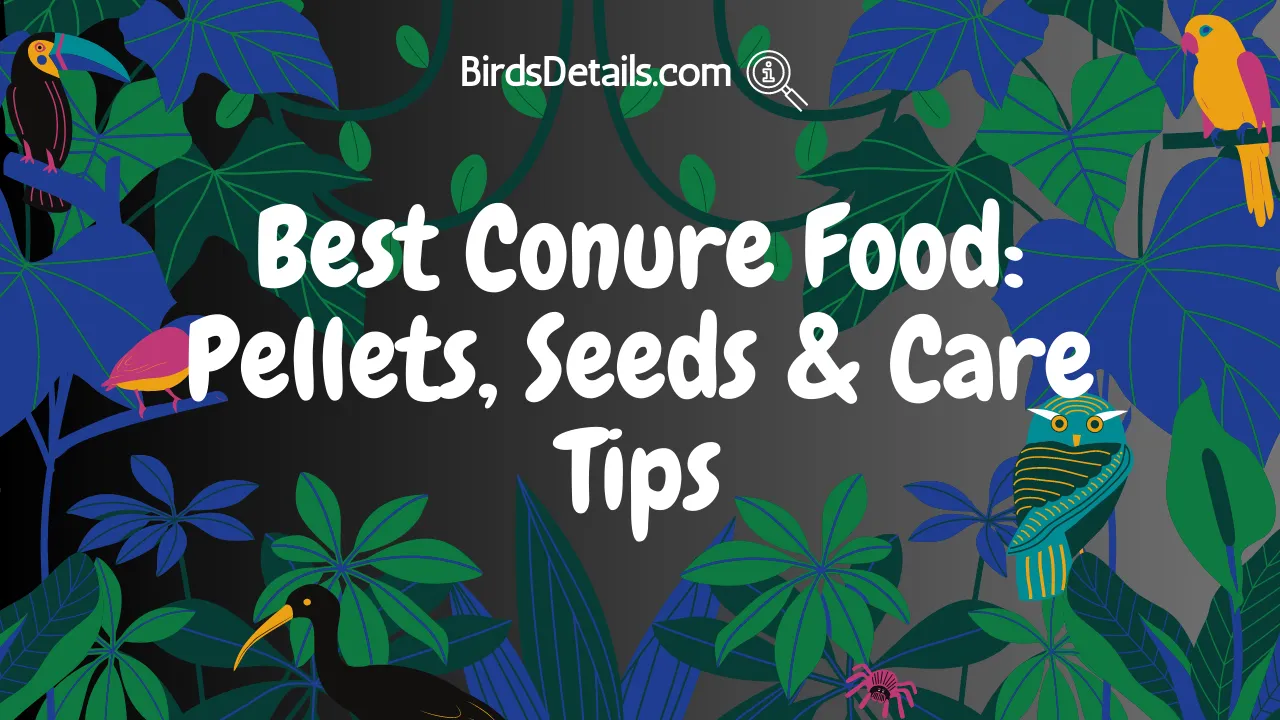Are you a proud owner of pet conures, parrots, cockatiels, or wild conures? If so, then you must know how important it is to provide your feathered pets with a balanced and nutritious diet. Best Conure Food plays a crucial role in maintaining the health and well-being of your pets.
A healthy conure diet should consist of pellets, fresh fruits, vegetables, and occasional treats. Pellets are an essential part of a conure’s diet as they provide all the necessary nutrients and are less messy than other foods. Fresh fruits and vegetables should be offered daily to provide variety and additional nutrients. Wild conures, parrots, and cockatiels can also benefit from similar diets.
However, treats such as fruit, seeds, and nuts should be given sparingly to pet conures and wild conures as they are high in fat and can lead to obesity if overfed. It is important for parrot owners to research and choose high-quality conure food brands to ensure that their pets are receiving proper nutrition.
In this article, we will discuss everything you need to know about a parrot food diet, including what conures eat. how to make Nutri-rich conure food for your pets, a conure food list, and much more. So let’s dive right in and cite the best practices for keeping your parrot healthy and happy.
| Food | Description |
|---|---|
| Pellets | A high-quality pellet food should be the staple of your conure’s diet. Look for a pellet food that is specifically formulated for conures and that is high in protein and low in fat. Some popular brands of pellet food for conures include Harrison’s Bird Foods, Zupreem Natural, and Roudybush. |
| Seeds | Seeds should be limited in a conure’s diet. They are high in fat and can lead to weight gain. However, you can offer them a small amount of seeds as a treat. Some healthy seeds for conures include millet, sunflower seeds, and almonds. |
| Fruits and vegetables | Conures love to eat fruits and vegetables. Offer them a variety of different fruits and vegetables, such as apples, bananas, carrots, broccoli, and spinach. Avoid giving them avocado, citrus fruits, and rhubarb, as these foods can be toxic to birds. |
| Nuts | Nuts should also be limited in a conure’s diet. They are high in fat and can lead to weight gain. However, you can offer them a small amount of nuts as a treat. Some healthy nuts for conures include almonds, walnuts, and peanuts. |
| Treats | You can offer your conure occasional treats, such as millet spray, fruit loops, or yogurt drops. However, it is important to limit the amount of treats that you give them, as they can be high in sugar and fat. |
Importance of a Nutritious Diet for Conures
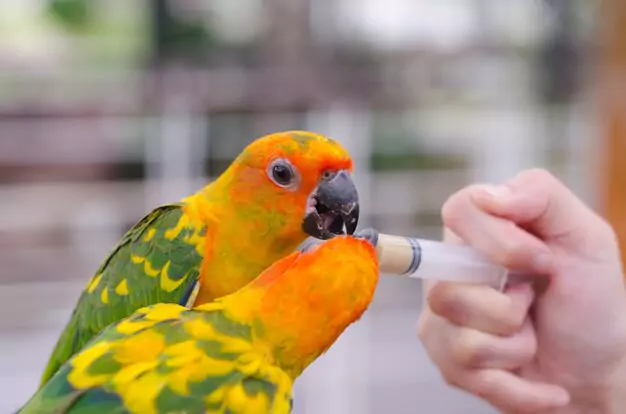
If you are a proud owner of a conure or parrot, then you know how important it is to keep them healthy and happy. One way to achieve this is by providing them with a nutritious diet that includes supplements and moist food. A balanced and varied diet can help prevent nutritional deficiencies and ensure that your conure or parrot lives a long and healthy life without having to worry about the price.
Why a Nutritious Diet is Crucial for Conures
Conures and other parrots require a balanced diet that includes fresh fruits, vegetables, grains, and proteins. A lack of proper nutrition can lead to various health issues in conures and other parrots such as malnutrition, obesity, and weakened immune system. Feeding conures and other parrots with a diet high in fat, sugar, and salt can cause liver disease, heart problems, and other serious health complications. It’s important to offer moist food to ensure they stay hydrated. When choosing food for your conure or other parrot, consider the price as well to ensure you’re providing them with the best possible nutrition within your budget.
Providing Your Conure with the Right Food
It’s important to provide your bird with nutritious food that won’t break the bank. You should avoid feeding your bird foods that are high in fat or sugar and instead focus on providing them with fresh fruits and vegetables like apples, carrots, broccoli, and kale. Nutritious grains like brown rice or quinoa can also be great additions to their diet. Consider giving them lean protein sources like chicken or fish to ensure they’re getting all the necessary nutrients. With these star ingredients, you can provide your bird with a well-balanced diet without sacrificing price.
It’s essential to ensure that your conure has access to clean water and moist food at all times. Make sure you change their water frequently throughout the day. The price of a high-quality lb of conure food can vary depending on the brand and star rating.
Signs Your Conure Needs More Nutrition
If your conure is eating more than usual or seems lethargic or weak lately despite having enough sleep time during the day; they might be lacking proper nutrition. It’s essential to monitor their behavior closely so you can identify any changes in their eating habits or activity levels. Adding moist food to their diet can help improve their health, but be mindful of the price per lb and read reviews from other bird owners to ensure you’re choosing a quality brand with high stars.
Types of Food Suitable for Conures: Pellets and Bird Seed
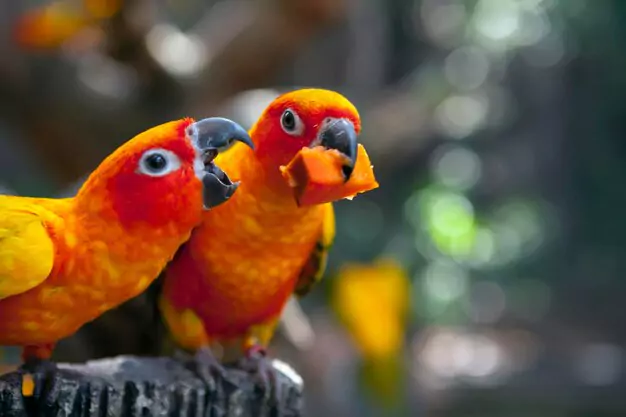
If you are a conure owner, you might be wondering what types of food are suitable for your feathered friend. The two main types of food that are recommended for conures are pellets and bird seed. In this article, we will discuss the benefits and drawbacks of each type of food, as well as some tips on feeding your conure.
Pellets
Pellets are a complete and balanced diet that contains all the necessary nutrients for conures. They come in different sizes and flavors, so you can choose the one that your conure likes best. Pellets have several advantages over birdseed:
- Complete nutrition: Pellets contain all the essential vitamins and minerals that your conure needs to stay healthy.
- Convenience: Pellets, a diet pro health option, are easy to measure and store, which makes them a convenient choice for busy pet owners who want to incorporate eggs into their pet’s diet.
- Less mess: Unlike birdseed, pellets fortified with diet-healthy eggs do not scatter around the cage or create a lot of waste.
To ensure that your conure gets all the necessary nutrients from pellets, make sure to choose a high-quality brand that is specifically formulated for parrots. You should also avoid giving your conure too many treats or human foods, as they can disrupt the balance of its diet.
Bird Seed
Bird seed is a good source of protein, fat, and fiber, but it lacks some essential vitamins and minerals that pellets provide. Conures enjoy a variety of seeds such as sunflower, safflower, and millet, but they should be given in moderation. Here are some pros and cons of feeding your conure with bird seed:
- Variety: Seeds come in different shapes and colors which can make mealtime more interesting for your conure.
- Natural diet: In the wild, birds eat mostly seeds so feeding them with seeds is closer to their natural diet.
- Imbalanced nutrition: Seeds do not contain all the necessary nutrients that your conure needs, so you should supplement them with pellets or fresh fruits and vegetables.
- Messy: Seeds can scatter around the cage and create a lot of waste, which means more cleaning for you.
If you decide to feed your conure with bird seed, make sure to buy high-quality seeds that are free from mold and insects. You should also avoid giving your conure too much fatty or salty food, as they can cause health problems in the long run.
Lovebird Food
Lovebird food is another type of bird food that can be used as a supplement to the conure’s diet. However, it should not replace pellets or seeds. Lovebird food contains a mix of seeds, pellets, and dried fruits that provide some variety to your conure’s diet. You can offer lovebird food as an occasional treat or mix it with other types of bird food.
Feeding Tips
Here are some tips on feeding your conure:
- Provide fresh water and clean food dishes daily to ensure the health and well-being of your conure.
- Offer a variety of foods such as fruits, vegetables, and grains to keep your conure interested in its diet.
- Avoid giving your conure too many treats or human foods as they can disrupt the balance of its diet.
- If you want to convert your bird to a pelleted diet, start by introducing small amounts of pellets mixed with its regular seed mix. Gradually increase the amount of pellets over several weeks until your bird is eating mostly pellets.
Tips for Properly Feeding Pet Conures
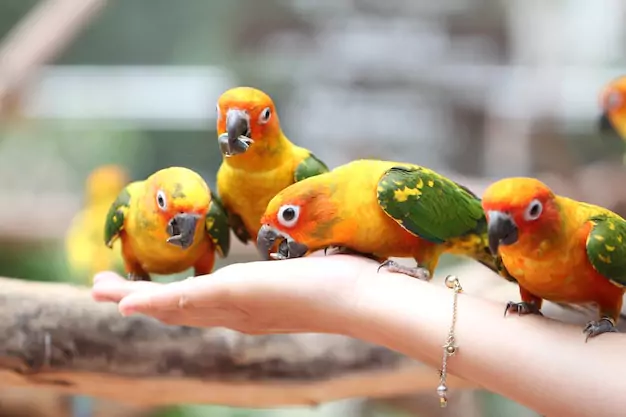
Feeding your pet conure a proper diet is crucial for maintaining their health and happiness. Here are some tips to help you ensure that your feathered friend is getting the nutrition they need:
Provide a Balanced Diet
A balanced diet is essential for keeping your conure healthy. This should include a mix of pellets, fresh fruits, and vegetables. Pellets are a great source of nutrients and should make up the bulk of your conure’s diet. However, it’s important to supplement this with fresh foods to provide variety and additional nutrients.
When choosing fruits and vegetables, opt for those that are high in vitamins and minerals but low in fat, salt, and sugar. Some good options include apples, bananas, grapes, carrots, broccoli, and kale.
Avoid Unhealthy Foods
Just like humans, conures can suffer from health problems if they consume too much fat or sugar. Avoid feeding your bird junk food or anything high in fat or sugar. This includes things like candy, chocolate, chips, fried foods, and processed snacks.
Avoid giving your bird any food that is toxic to birds such as avocado or chocolate.
Offer Variety
Conures are intelligent birds that enjoy exploring new things. Offering a variety of foods can help prevent boredom while also providing different nutrients. You can also encourage their natural foraging behavior by hiding treats around their cage or offering them puzzle toys filled with food.
Monitor Food Intake
It’s important to monitor how much food your conure eats each day to ensure they maintain a healthy weight. A general rule of thumb is to offer 1-2 tablespoons of pellets per day along with fresh fruits and vegetables as desired.
If you notice that your bird is gaining weight or losing weight rapidly despite eating an appropriate amount of food each day then consult with an avian veterinarian who specializes in birds immediately.
Consult with a Professional
If you have any concerns about your conure’s diet or health, it’s always best to consult with a veterinarian or avian specialist. They can provide specific dietary recommendations based on your bird’s age, health, and activity level.
In addition to proper nutrition, it’s also important to play with and groom your conure regularly. This helps keep them mentally stimulated and physically healthy. However, be sure to do this in a way that is safe for both you and your bird.
Maintaining Conure Health Through Diet: Key Considerations

Your conure’s health is of utmost importance, and a balanced diet plays a significant role in ensuring their well-being. In this article, we will discuss some key considerations to keep in mind.
A Balanced Diet Is Essential for Maintaining Conure Health
A balanced diet is crucial for your conure’s overall health. It should include a mix of fruits, vegetables, grains, and proteins. This variety ensures that your bird receives all the necessary nutrients they need to thrive.
The Quality of Food Is Crucial in Ensuring That Your Conure Receives the Necessary Nutrients
The quality of food you feed your conure is just as important as the variety. It’s essential to choose high-quality foods that are free from pesticides and other harmful additives. Organic options are ideal if they fit within your budget.
Too Much Fat in a Conure’s Diet Can Lead to Health Problems
While fat is an essential part of any diet, too much of it can lead to health problems for your conure. High-fat foods should be limited or avoided altogether. Instead, opt for lean proteins like chicken or fish.
Conures Require a Variety of Foods to Maintain Optimal Health
As previously mentioned, variety is key. They require different types of food to maintain optimal health and prevent boredom with their meals. Consider rotating between different fruits and veggies throughout the week.
Consult with a Veterinarian to Determine the Best Diet Plan for Your Conure
Every bird is unique, and their dietary needs may vary depending on factors such as age and activity level. It’s always best to consult with a veterinarian who specializes in avian care before making any significant changes to your conure’s diet plan.
Finding Healthy and Nutritious Food Options for Conures: Where to Look
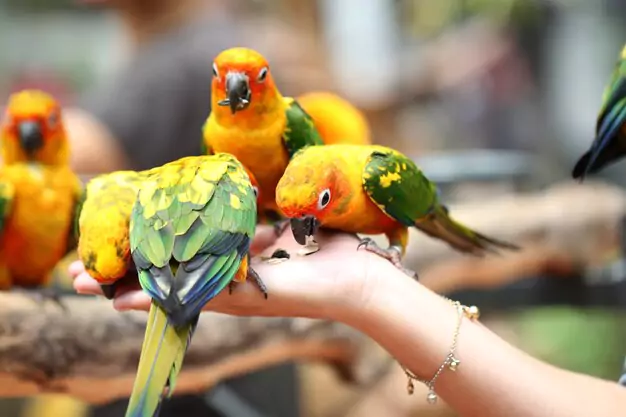
As a conure owner, you want to provide your pet bird with the best possible nutrition to keep it healthy and happy. But with so many food options available, it can be overwhelming to know where to start. In this article, we’ll explore some of the best places to look for healthy and nutritious conure food options.
Pet Stores
Pet stores are a great place to start when looking for conure food options. Most pet stores offer a wide variety of commercial bird foods, including pellets, seeds, and fresh fruits and vegetables. These foods are specifically formulated with the essential nutrients that your conure needs.
When choosing commercial bird food at a pet store, make sure to read the labels carefully. Look for foods that contain high-quality ingredients such as whole grains, fruits, vegetables, and lean proteins. Avoid foods that contain artificial colors or flavors.
Online Retailers
If you can’t find what you’re looking for at your local pet store, consider browsing online retailers. Many online retailers specialize in selling bird food and supplies and may offer specialty brands that aren’t available in local stores.
When shopping online for conure food options, pay attention to shipping costs and delivery times. Make sure that the retailer has secure payment processing methods in place before making any purchases.
Consulting with a Veterinarian or Avian Specialist
Consulting with a veterinarian or avian specialist can provide valuable insight into the specific nutritional needs of your conure. A professional can recommend appropriate food options based on your bird’s age, health status, activity level, and other factors.
When consulting with a professional about conure nutrition, be prepared to discuss your bird’s current diet and any health concerns you may have. Ask questions about which types of foods are best suited for your particular bird species.
Making Your Bird Food
Conure owners can also consider making their bird food using recipes that incorporate nutrient-rich ingredients such as quinoa, sweet potatoes, and leafy greens. Making your bird food allows you to control the quality of the ingredients and ensure that your conure is getting all the essential nutrients it needs.
When making your bird food, make sure to follow a recipe that has been specifically formulated for birds. Avoid using any ingredients that are toxic to birds, such as avocado or chocolate.
What About People’s Food?
While it’s tempting to share your meals with your pet bird, not all human foods are safe for conures to eat. Some common human foods that are toxic to birds include chocolate, caffeine, alcohol, and avocado.
If you want to offer your conure a treat from the table, stick with small amounts of fresh fruits and vegetables. Make sure that any fruits or vegetables offered are washed thoroughly and free from pesticides.
Key Nutrients Needed in a Conure’s Diet: Gravel, Vitamins, Minerals, and Amino Acids
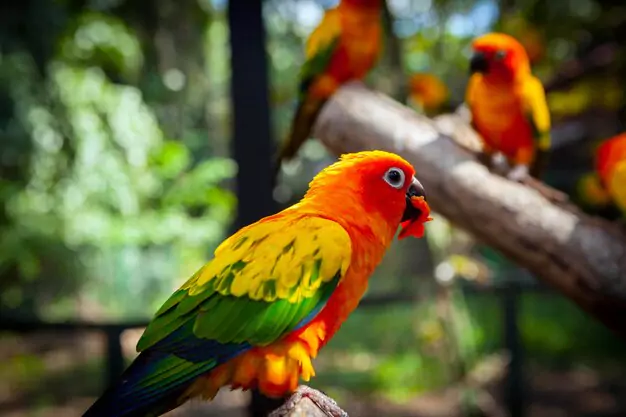
It is important to ensure that they are receiving the necessary nutrients for their overall health and well-being. In addition to providing fresh fruits and vegetables, there are specific key nutrients that should be included in a conure’s diet. These include gravel or grit, vitamins, minerals, and amino acids.
Gravel or Grit
Gravel or grit is an important component of a conure’s diet as it helps them grind their food in their gizzard. The gizzard is a muscular organ found in birds that helps break down food by grinding it with small stones or other abrasive materials like gravel or grit. Without this essential component in their diet, conures may have difficulty digesting their food properly which can lead to health issues such as malnutrition.
It is recommended to provide your conure with commercially available bird grit made specifically for small birds like conures. Avoid using sandpaper perch covers or other abrasive materials as they can cause harm to your bird’s digestive system.
Vitamins and Minerals
Vitamins and minerals are essential for a conure’s overall health and well-being. A balanced diet that includes fresh fruits and vegetables can provide most of the necessary vitamins and minerals needed by your conure.
However, some conures may require additional vitamin or mineral supplements recommended by a veterinarian based on their individual needs. It is important not to over-supplement your bird with vitamins or minerals as this can lead to toxicity which can be harmful to their health.
Calcium is an important mineral that should be included in a conure’s diet in small amounts to support bone health. Too much calcium can be harmful so it’s important to monitor the amounts given to your conure.
Amino Acids
Amino acids are the building blocks of protein and are essential for a conure’s growth, development, and overall health. Conures require a diet that is high in protein to support their active lifestyle.
Protein can be found in many foods such as nuts, seeds, legumes, and grains. It is important to provide your conure with a variety of protein sources to ensure they are receiving all the necessary amino acids.
Setting Up Your Conure’s Home: Tips for Creating a Safe and Healthy Environment
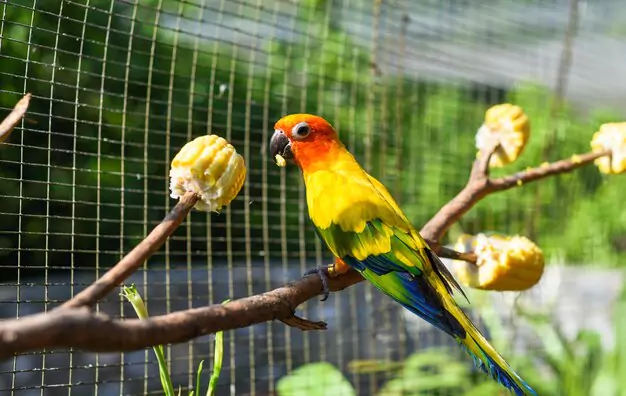
If you’re a proud owner of a conure, then you know how important it is to provide them with a safe and healthy environment. Your conure’s home is where they will spend most of their time, so it’s crucial to ensure that it’s comfortable and stimulating. In this article, we’ll discuss some tips for setting up your conure’s home.
Choose an Appropriate Size Cage for Your Conure Based on Their Species and Size
there are several factors to consider. First and foremost, you need to make sure that the cage is big enough for your bird to move around freely. The size of the cage should be based on your bird’s species and size.
Conures are active birds that require plenty of space to fly around in. A good rule of thumb is to choose a cage that is at least twice as wide as your bird’s wingspan. For example, if your conure has a wingspan of 20 inches, then you should choose a cage that is at least 40 inches wide.
Provide Toys and Perches to Keep Your Conure Entertained and Stimulated Throughout the Day
Conures are intelligent birds that require mental stimulation throughout the day. Providing toys and perches in their cage can help keep them entertained and prevent boredom.
Toys come in different shapes, sizes, colors, textures, sounds, and prices. Some popular toys for conures include ropes, bells, swings, ladders, puzzles, and chew toys made from wood or leather materials.
Perches are also essential for your conure’s health because they promote exercise by providing opportunities for climbing or jumping around inside their cage. Make sure to provide perches of varying thicknesses so that your bird can exercise its feet muscles properly.
Make Sure to Clean Your Conure’s Cage and Provide Fresh Water Daily to Prevent Health Problems
Cleanliness is crucial. You should clean your bird’s cage at least once a week, but more often if necessary. Remove any uneaten food, droppings, and debris from the cage daily.
Provide fresh water in a clean bowl every day. Change the water twice a day during hot weather or if your conure drinks excessively.
During the Transition Period, Give Your Conure Time to Adjust to Their New Home and Family
If you’ve just brought home a new conure, it’s essential to give them time to adjust to their new surroundings. The transition period can be stressful for both you and your bird.
During this time, try not to handle your conure too much, as they may be scared or nervous. Allow them some quiet time alone in their cage so that they can get used to their new environment.
Consider Purchasing High-Quality Food from Brands like Lafeber to Ensure Your Conure’s Diet is Well-Balanced
Conures require a well-balanced diet that includes fruits, vegetables, seeds, nuts, grains, and pellets. It’s essential to provide high-quality food that meets all of your bird’s nutritional needs.
Lafeber is one of the leading brands in the market for bird food products. They offer various options for different species of birds with different dietary requirements. You can choose from their range of seed mixes or pellet foods depending on what suits your bird best.
Nutritious Food Options for Conures: Foraging Fun Pack, Avicakes, Nutriberries, Gourmet Pellets

If you are a conure owner, you know how important it is to provide your feathered friend with nutritious food options. Luckily, there are several products available that offer a balanced diet with essential nutrients for your conure’s health and well-being.
The Benefits of Foraging Fun Pack
Foraging Fun Pack is an excellent option for conures who love to play and explore. This product offers a mix of fruits, vegetables, nuts, and seeds that are all-natural and free from preservatives. The ingredients are chopped into small pieces that make it easier for birds to eat and digest.
The best part about the Foraging Fun Pack is that it comes in a resealable bag that keeps the food fresh and prevents spoilage. This product provides stimulation for your birds as they have to work their way through the mix to find their favorite foods.
What Are Avicakes?
Avicakes are another great option for conures as they contain a blend of seeds and grains that mimic the natural diet of wild conures. These cakes also contain essential vitamins and minerals that promote healthy digestion and strong immune systems.
One benefit of Avicakes is their convenient size – they can be broken into smaller pieces or served whole depending on your bird’s appetite. They also come in various flavors such as cornbread or cranberry which adds some excitement to mealtime.
Why Choose Nutriberries?
Nutriberries are small round pellets made from grains, fruits, vegetables, and berries. They offer complete nutrition with added vitamins and minerals making them an excellent choice for busy pet owners who want to ensure their birds get all the necessary nutrients without having to prepare meals themselves.
These pellets come in different sizes suitable for different bird species including cockatiels which makes them versatile. They can be served dry or moistened with water for added texture and variety. Nutriberries also come in different flavors such as tropical fruit or papaya which makes mealtime more enjoyable.
Gourmet Pellets – A Nutritious Option
Gourmet pellets are another great option for conure owners who want to provide their birds with a balanced diet. These pellets contain a blend of seeds, grains, fruits, and vegetables that provide essential nutrients for your bird’s health.
What sets gourmet pellets apart is the fact that they are fortified with vitamins and minerals making them an excellent source of nutrition. They also come in various flavors such as orange or carrot which makes mealtime more exciting for your bird.
Adding Moist Food to Your Conure’s Diet
In addition to these dry food options, it is also important to include moist food in your conure’s diet. Fresh fruits like apples, bananas, and berries can be chopped up and served alongside their regular meals. Scrambled eggs are another great option that provides protein and other essential nutrients.
These moist foods can be served in a separate dish or stuffed inside a foraging toy bag which adds stimulation and excitement during mealtime. It is important to note that fresh food should be removed after a few hours to prevent spoilage.
Providing the Best Diet for Your Conure
Feeding your pet conure a nutritious diet is essential for maintaining their health and happiness. As you have learned, conures need a balanced diet that includes pellets, bird seed, gravel, vitamins, minerals, and amino acids.
To properly feed your pet conure, it’s important to follow some tips such as offering fresh food daily, providing clean water at all times, and avoiding sugary treats that can harm their digestive system. You should set up your home in a safe and healthy environment.
When looking for healthy and nutritious food options for your conure, be sure to check out products like Foraging Fun Pack, Avicakes, Nutriberries, and Gourmet Pellets. These options provide the necessary nutrients while also keeping your bird entertained.
Remember that providing the best diet for your conure is crucial to their overall well-being. By following the guidelines we’ve discussed here today, you can ensure that your feathered friend stays happy and healthy for years to come.
So go ahead and take action now! Start by checking out some of the recommended food options mentioned above or consult with a veterinarian who specializes in birds. Your conure will thank you!
